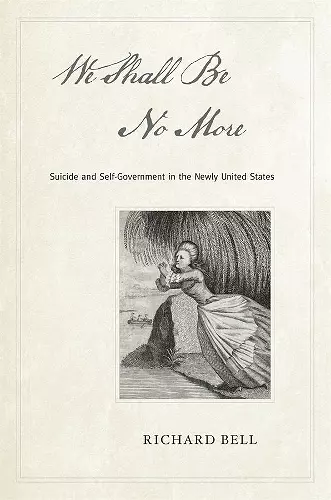We Shall Be No More
Suicide and Self-Government in the Newly United States
Format:Hardback
Publisher:Harvard University Press
Published:19th Apr '12
Currently unavailable, and unfortunately no date known when it will be back

Richard Bell takes us among the inner demons early Americans encountered, and offers as reliable a picture of this fractured reality as we are likely to get. His book is engagingly written, as visceral a cultural history as you will find. -- Andrew Burstein, coauthor of Madison and Jefferson A thoughtful and provocative look at the cultural politics of suicide in the early American Republic. After reading We Shall Be No More, it will be impossible to look at suicide and not recognize the deep political issues it evokes. -- Michael Meranze, author of Laboratories of Virtue: Punishment, Revolution, and Authority in Philadelphia, 1760-1835 The conflict between individual liberty and mutual obligation was at the heart of republican society and government, and in Bell's capable hands suicide is revealed as a crucial battleground in that struggle. A remarkable book. -- Simon Newman, author of Embodied History: The Lives of the Poor in Early America
Though suicide is an individual act, Richard Bell reveals its broad social implications in early America. From Revolution to Reconstruction, everyone—parents, newspapermen, ministers and abolitionists alike—debated the meaning of suicide as a portent of danger or of possibility in a new nation struggling to define itself and its power.
Suicide is a quintessentially individual act, yet one with unexpectedly broad social implications. Though seen today as a private phenomenon, in the uncertain aftermath of the American Revolution this personal act seemed to many to be a public threat that held no less than the fate of the fledgling Republic in its grip.
Salacious novelists and eager newspapermen broadcast images of a young nation rapidly destroying itself. Parents, physicians, ministers, and magistrates debated the meaning of self-destruction and whether it could (or should) be prevented. Jailers and justice officials rushed to thwart condemned prisoners who made halters from bedsheets, while abolitionists used slave suicides as testimony to both the ravages of the peculiar institution and the humanity of its victims. Struggling to create a viable political community out of extraordinary national turmoil, these interest groups invoked self-murder as a means to confront the most consequential questions facing the newly united states: What is the appropriate balance between individual liberty and social order? Who owns the self? And how far should the control of the state (or the church, or a husband, or a master) extend over the individual?
With visceral prose and an abundance of evocative primary sources, Richard Bell lays bare the ways in which self-destruction in early America was perceived as a transgressive challenge to embodied authority, a portent of both danger and possibility. His unique study of suicide between the Revolution and Reconstruction uncovers what was at stake—personally and politically—in the nation’s fraught first decades.
In We Shall Be No More: Suicide and Self-Government in the Newly United States, Richard Bell movingly emphasizes the sometimes clumsy efforts of American asylums and humanitarian societies to care for those who tried to kill themselves, but who lived on for days, weeks, or years afterwards. Bell never forgets that suicide is about individuals and the persistence or recovery of their stories. His arresting, involving work on the young American republic brings out the farcical and tragic aspects of suicide. It also reveals a healthy suspicion of commentators in all periods who lament the helter-skelter decline of manners and morals, whether due to changes in legislation or reading habits. -- Freya Johnston * Times Literary Supplement *
A thoughtful and provocative look at the cultural politics of suicide in the early American Republic. After reading We Shall Be No More, it will be impossible to look at suicide and not recognize the deep political issues it evokes. -- Michael Meranze, author of Laboratories of Virtue: Punishment, Revolution, and Authority in Philadelphia, 1760–1835
The conflict between individual liberty and mutual obligation was at the heart of republican society and government, and in Bell’s capable hands suicide is revealed as a crucial battleground in that struggle. A remarkable book. -- Simon Newman, author of Embodied History: The Lives of the Poor in Early America
Richard Bell takes us among the inner demons early Americans encountered, and offers as reliable a picture of this fractured reality as we are likely to get. His book is engagingly written, as visceral a cultural history as you will find. -- Andrew Burstein, coauthor of Madison and Jefferson
- Nominated for OAH Frederick Jackson Turner Award 2013
- Nominated for Lawrence W. Levine Award 2013
- Nominated for Merle Curti Award 2013
- Nominated for Fraunces Tavern Museum Book Award 2013
- Nominated for SHEAR Book Prizes 2012
ISBN: 9780674063723
Dimensions: unknown
Weight: unknown
344 pages